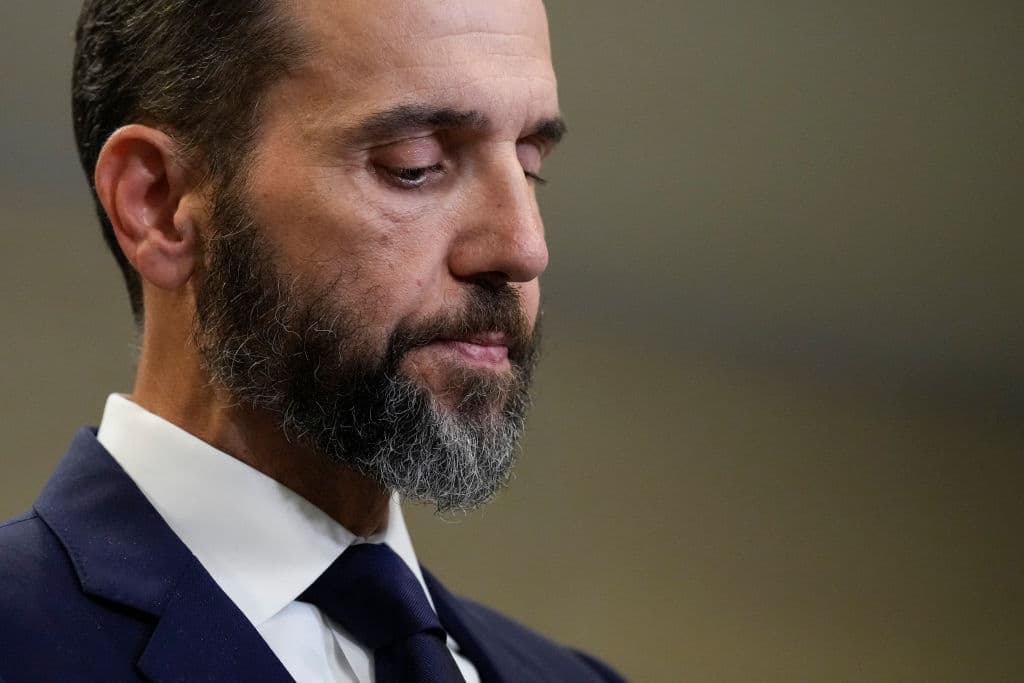Jack Smith Is, in Constitutional Terms, ‘Too Big for His Britches,’ Author of New Brief in Trump Case Says
The latest challenge to the special counsel argues that his appointment is the constitutional equivalent of a ‘bubble gum wrapper.’

The filing of a new brief arguing that Special Counsel Jack Smith’s appointment is crosswise with the Constitution underscores that the prosecutor’s own authority is an increasingly contested question. Its arguments will be mulled over by Judge Aileen Cannon, in whose courtroom Mr. Smith has struggled.
Two law professors, Joshua Blackman and Seth Barrett Tillman, have proffered, in the Southern District of Florida, the argument that Mr. Smith’s prosecutions of Mr. Trump in the January 6 and Mar-a-Lago cases are ultra vires, or outside the law, because the special counsel is, in the eyes of the law, but an “employee.”
Mr. Barrett Tillman tells the Sun that assigning these prosecutions to a special counsel rather than a conventionally appointed United States attorney is akin to putting the power to prosecute in a “bubble gum wrap rather than a Corvette.” Meaning it is a flimsy container for an awesome power. He calls it an act of “cowardice” on the part of the Biden administration, which he urges to “follow the law.”
Messrs. Blackman and Barrett Tillman are no strangers to bucking constitutional conventional wisdom. They are in the van on the question of whether the president is an “officer of the United States.” They argue that he is not and therefore not subject to the Disqualification Clause of the 14th Amendment. While the Supreme Court did not reach that question in its unanimous ruling keeping Mr. Trump on the Colorado ballot, the justices appeared open to it.
Now, the two scholars argue that Mr. Smith’s appointment violates the Appointments Clause. “Congress,” that clause ordains, “may by Law vest the Appointment of such inferior Officers, as they think proper, in the President alone, in the Courts of Law, or in the Heads of Departments.” That means inferior officers, unlike principal ones, do not need nomination by the president and confirmation by the Senate.
For Messrs. Blackman and Barrett Tillman, though, Mr. Smith is not even an inferior officer — he is a mere “employee.” They cite a Supreme Court case from 1868, United States v. Hartwell, for the proposition that the Framers understood an “officer” as someone whose duties were “continuing and permanent, not occasional or temporary.” Mr. Smith, though, has been hired for a season — to prosecute the two federal cases against Mr. Trump.
Constitutionally speaking, Mr. Smith is “too big for his britches,” Mr. Blackman tells the Sun. The contemporary special counsel is defined, he explains, by his transitoriness. The brief explains that “if all of the current special counsels finish their work, their positions would cease to exist, and there is no continuing institutional framework that would remain.”
The rub, though, is that the special counsel regulations under which Attorney General Garland appointed Mr. Smith treat the special counsel as an “officer,” and empower him to exercise corresponding powers. If Mr. Smith is an employee, he would require, as the brief explains, the “supervision of the duly-nominated, confirmed, and appointed United States Attorney for the Southern District of Florida.”
Paraphrasing a line from Justice Antonin Scalia with respect to what was then called independent counsels — that “this wolf comes as a wolf” — Mr. Blackman reckons that when it comes to Mr. Smith, “this employee comes as an employee.” He and Mr. Barrett Tillman figure that the work the special counsel has already done could be “salvageable,” but that any future labor would be outside the bounds of constitutional legality.
Mr. Smith also faces a separate challenge to his appointment mounted by another set of legal sages — Attorneys General Meese and Mukasey, and law professors Steven Calabresi and Gary Lawson. They also argue that Mr. Smith’s appointment is defective, but for another reason — that he is a principal officer in an inferior one’s clothing.
Because Mr. Smith was not appointed by the president and confirmed by the Senate, reason General Meese et al, he must be an inferior officer. The powers he exerts are, according to this group, more akin to those of a principal officer. Mr. Smith responds that his work is valid under the Appointments Clause because General Garland can fire him at any time.
The decision whether Mr. Smith is constitutionally appointed will now be Judge Cannon’s to make, and it comes at a pivotal time for the case against Mr. Trump and two of his employees for illegally stashing secret documents from his presidency at Mar-a-Lago. A trial date for the case has not yet been set, as Judge Cannon makes her way through pretrial arguments like this one.

